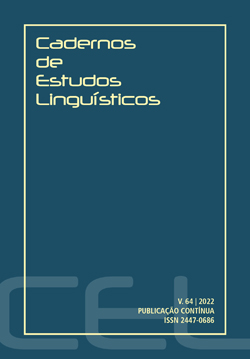Abstract
This study uses materialist discourse analysis to analyze the discursive functioning of what we propose as places of authority: facts of language in relation to memory constituted as contradictory elements, given the conditions in which the discourse was produced. We make reference to images and words published in social media about statements that are controversial or offensive to feminists. In the analysis, a particular functioning of discursive memory was observed in the movements of the senses, producing authoritarian effects, whitch also came from the work of the discursive formations in tension. Intersections of meanings were identified that put apparently incompatible types of discourse - progressive and conservative - together, producing repetition rather then rupture, through the operation of places of authority.
References
ACHARD, P.. Memória e produção discursiva do sentido. In: ACHARD, P. et al (Org.). Papel da memória. Campinas, Pontes Editores, 1999, p.11-22.
CONCEIÇÃO, A. C. L. Teorias feministas: da "questão da mulher" ao enfoque de gênero. RBSE, v. 8, n. 24, p. 738-757, 2009.
FATIMA, Wellton da Silva de. Do beijo na telenovela ao repúdio parlamentar: discurso, memória e ideologia. In: LAU, Héliton Diego; FATIMA, Wellton da Silva de. (Org.) Raça, gênero e sexualidade em perspectivas discursivas: efeitos e práticas da/na violência. v. 2. São Paulo: Pimenta Cultural, 2020, p. 270-288.
FOLLMANN, José Ivo; PINHEIRO, Adevanir Aparecida. A categoria raça nas Ciências Sociais: revisitando alguns processos políticos, sociais e culturais na história do Brasil Ciências Sociais Unisinos, vol. 49, núm. 1, 2013, p. 26-29. Universidade do Vale do Rio dos Sinos: São Leopoldo, Brasil. Disponível em: http://www.redalyc.org/articulo.oa?id=93826318008. Acesso em: 16 ago. 2022.
FOUCAULT, Michel. A arqueologia do saber. 8. ed. Rio de Janeiro: Forense Universitária, 2014.
GONZALEZ, L. A categoria político-cultural de amefricanidade. Tempo brasileiro, Rio de Janeiro, n. 92-93, jan./jun., 1988. Disponível em: https://drive.google.com/file/d/0B2_ZK-qR9WEKYWJhZDI3NDYtMTE0Zi00ZDg0LTk1OTMtOTM1NzMxNzhlYjBh/view. Acesso em: 28 maio 2020.
LAGAZZI-RODRIGUES, S. O recorte significante na memória. In: SEMINÁRIO DE ESTUDOS EM ANÁLISE DO DISCURSO, 3, 2007, Porto Alegre. Anais do SEAD, Porto Alegre: UFRGS, 2007.
MUNANGA, K. Negritude: usos e sentidos. 4. ed. 2. reimp. Belo Horizonte: Autêntica Editora, 2020.
ORLANDI, E. P. Análise de Discurso: princípios e procedimentos. 11. ed. Campinas: Pontes, 2013.
ORLANDI, E. P. Segmentar ou Recortar. Série Estudos, Faculdades Integradas de Uberaba, Uberaba-MG, n. 10, p. 9-26, 1984.
PÊCHEUX, M. O papel da memória. In: ACHARD, P. et al (Orgs.). Papel da memória. Campinas: Pontes Editores, 1999. p. 49-58.
PÊCHEUX, M. [1975]. Semântica e discurso: uma crítica à afirmação do óbvio. Campinas: Editora da Unicamp, 1995.
PINTO, C. R. J. Feminismo, história e poder. Revista de Sociologia e Política, Curitiba, v. 18, n. 36, p. 15-23, 2010.
ZOPPI FONTANA, Mónica Graciela. Lugares de enunciação e discurso. Leitura - Análise do Discurso, n. 23, p. 15-24, 1999.

This work is licensed under a Creative Commons Attribution-NonCommercial 4.0 International License.
Copyright (c) 2022 Cadernos de Estudos Linguísticos


